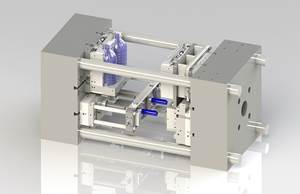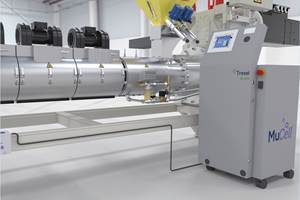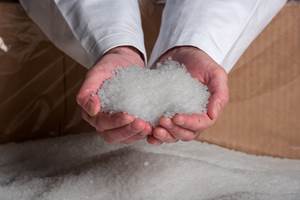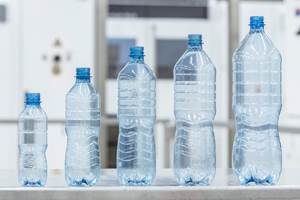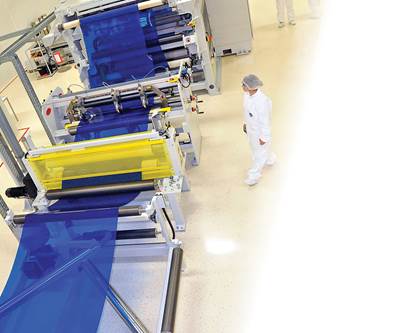Building a Consumer Packaging Powerhouse
TekniPlex extends footprint in consumer packaging through acquisitions, but plans to grow organically through a materials-science focus.
Share
When Plastics Technology last reported on TekniPlex (Feb. ’17 cover story), it was a $672 million processing concern whose growth had been driven largely through acquisitions. The acquisition trend has continued—the Wayne, Pa., company has nearly doubled its sales over the past five years. Last year alone, TekniPlex acquired Johnson Plastic Group, which specializes in precision extrusions for medical devices; Grupo Phoenix, which provides plastic and paper products to global brands in more than 20 vertical markets, including food and beverage, cosmetics and household products; and Keyes Packaging Group, a leading provider of environmentally friendly protective packaging for food and beverages. In January 2022, TekniPlex bought Fibro Corp., a Tacoma, Wash., producer of innovative molded-fiber packaging.
These moves—combined with a strategy to leverage technology and innovation across business units—have combined to position TekniPlex, perhaps better known for its array of medical products, to become a force in consumer packaging as well, serving a wide range of markets with a diverse portfolio of products for high-value, high-growth niches in food, dairy, beauty products, nutraceuticals, infant formula, coffee pods, protein powders, home-care products and more.
The company now has two main divisions. TekniPlex Healthcare is responsible for all diagnostic, drug-delivery and medical-device products, while TekniPlex Consumer Products covers all other products in the food, personal care and beauty and home markets. About a year ago, TekniPlex hired Eldon Schaffer to run consumer products as CEO. Schaffer brought with him nearly 30 years of executive experience with global suppliers of plastics closures, notably Aptar and Sequist Closures. As executive v.p. of Aptar, Schaffer was responsible for identifying key acquisition targets and integrating and improving their operations after the deals closed.
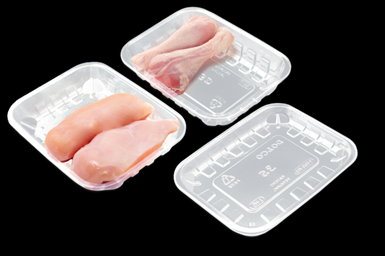
Trays for protein foods such as chicken are a big part of the product mix for Tekni-Plex Consumer Products. (Photos: Tekni-Plex)
“TekniPlex’s acquisition strategy is to fill gaps in our business,” says Schaffer. “For example, we had a great insight in the egg-carton business. We know how to protect the egg, have reliable service and quality, and are considered ‘best in market’ by many customers. But when we looked broadly at trends, we noticed a movement into fiber. Retailers want sustainability and we spotted a trend toward fiber cartons to address this need. This led to the Fibro acquisition. In the case of Grupo Phoenix, our strategy is to be strong in the perimeter of the grocery store. We had been providing packaging solutions for eggs, fresh foods and protein, where our customers are growing, but we were not big in dairy, food service, bakery and deli. Grupo Phoenix was strong in those segments. They also brought a Latin American footprint that TekniPlex did not have. That gave us the opportunity to expand our existing product offerings to that market, things like pump components, aerosol valve components. We, in turn, introduced Grupo Phoenix to retail chains in the fresh-food category along with some existing customers they did not have.”
In consumer packaging at TekniPlex, acquisitions are still part of the strategic plan, but in the here and now Schaffer is targeting 6-8% organic sales growth through innovation—leveraging its companywide expertise in materials science by sharing technology across business units. “There are lots and lots of suppliers, out there but we position ourselves as a provider of materials- and science-based solutions,” Schaffer says. “In our healthcare business, for example, one of our core competencies is multi-layer films for medical device and healthcare packaging. How are we to leverage that insight? How do we take some of that knowledge and bring it to the consumer side of the business?”
He continues, “In our consumer business we have seen a shift to fiber for meat trays. The challenge there is that juices leak. Like in the healthcare market, this is a ‘fluid management’ challenge. As a customer is looking for solutions, we tend to be proactive: ‘Have you thought of this? We’ve done some consumer research, this is what we found.’ We listen for the problems they are trying to solve, and we are in the position to supply unique, science-based solutions so that the customer can grow their business.”
Schaffer positions his unit as material-agnostic. That said, the company, by virtue of its legacy business in healthcare, knows that plastics are an invaluable and often irreplaceable tool to meet the industry’s mandates for drug efficacy and patient safety. These experiences have shaped TekniPlex’s cross-sector viewpoints on sustainability: Any materials agnosticism must not come at the expense of product protection or customer satisfaction. It's what the company calls committing to progress without being irresponsibly reactive while doing so.
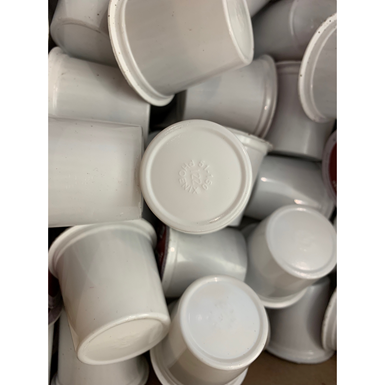
TekniPlex’s 2021 purchase of Grupo Phoenix gave the company a stronghold in the coffee pod business, where it continues to innovate with structures containing PCR.
This has led to the adoption of what TekniPlex calls its “sustainability and” strategy. He explains, “We are the only supplier of egg cartons that offers products in PET, PS and fiber. In PS, we offer a solution that contains PCR from coat hangers that we reclaim from retailers. We recently developed a foamed PS egg carton containing 25% PCR. This was the sustainable solution the customer required, and we were able to maintain the brand owner’s product identification and ensure market recognition with a clean, white package. We innovate around the customer to meet their sustainability goals.”
Schaffer adds, “We are working with a major coffee pod company to transition from a PS to a PP/EVOH pod that will be easier to recycle. But that pod must work exactly the same as the pod it replaced—across both the customer’s filling lines and the consumer’s coffee-making machines, tens of billions of times a year. Many brand owners have goals in place on sustainability but rely on our guidance on how they can achieve these goals. We come with material science to bring the right solution at the right time.”
Adds Shaffer, “We’ve honed our strategy, refined who we are and where we are going and what we are offering to our customer base. Our focus is adding value to our customers, and we’ll do this by leveraging material-science solutions that protect products, strengthen brands and innovate sustainably. When we do that, both we and our customers succeed.”
Related Content
At NPE, Cypet to Show Latest Achievements in Large PET Containers
Maker of one-stage ISBM machines will show off new sizes and styles of handled and stackable PET containers, including novel interlocking products.
Read MoreFoam-Core Multilayer Blow Molding: How It’s Done
Learn here how to take advantage of new lightweighting and recycle utilization opportunities in consumer packaging, thanks to a collaboration of leaders in microcellular foaming and multilayer head design.
Read More‘Monomaterial’ Trend in Packaging and Beyond Will Only Thrive
In terms of sustainability measures, monomaterial structures are already making good headway and will evolve even further.
Read MoreFirst Water Bottles With Ultrathin Glass Coating
Long used for sensitive juices and carbonated soft drinks, KHS Freshsafe PET Plasmax vapor-deposited glass coating is now providing freshness and flavor protection for PET mineral water bottles.
Read MoreRead Next
Extrusion Powerhouse Does It All
Tekni-Plex has evolved into a technically diverse global supplier of a wide range of extrusions for a host of markets, many of which are regulated.
Read More






